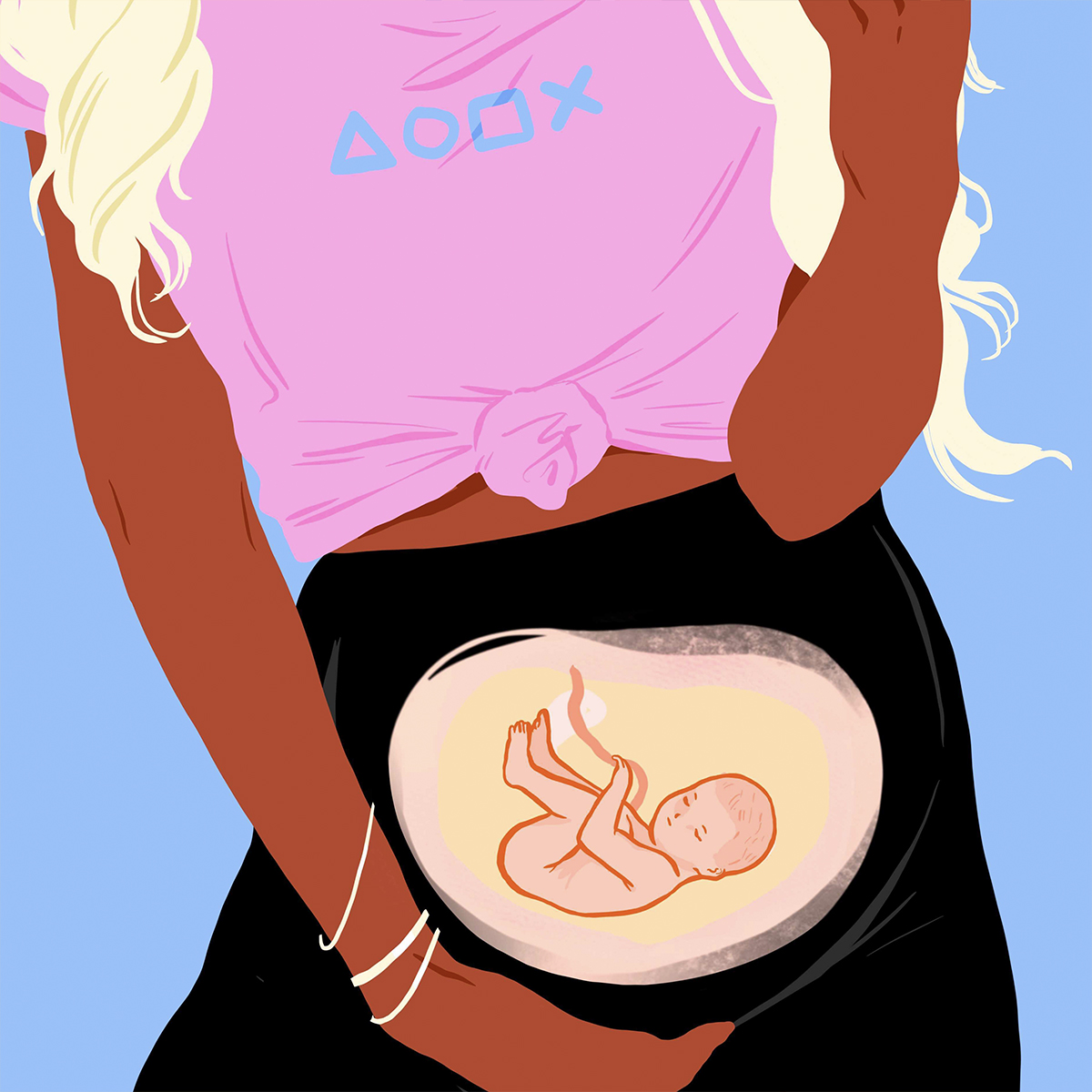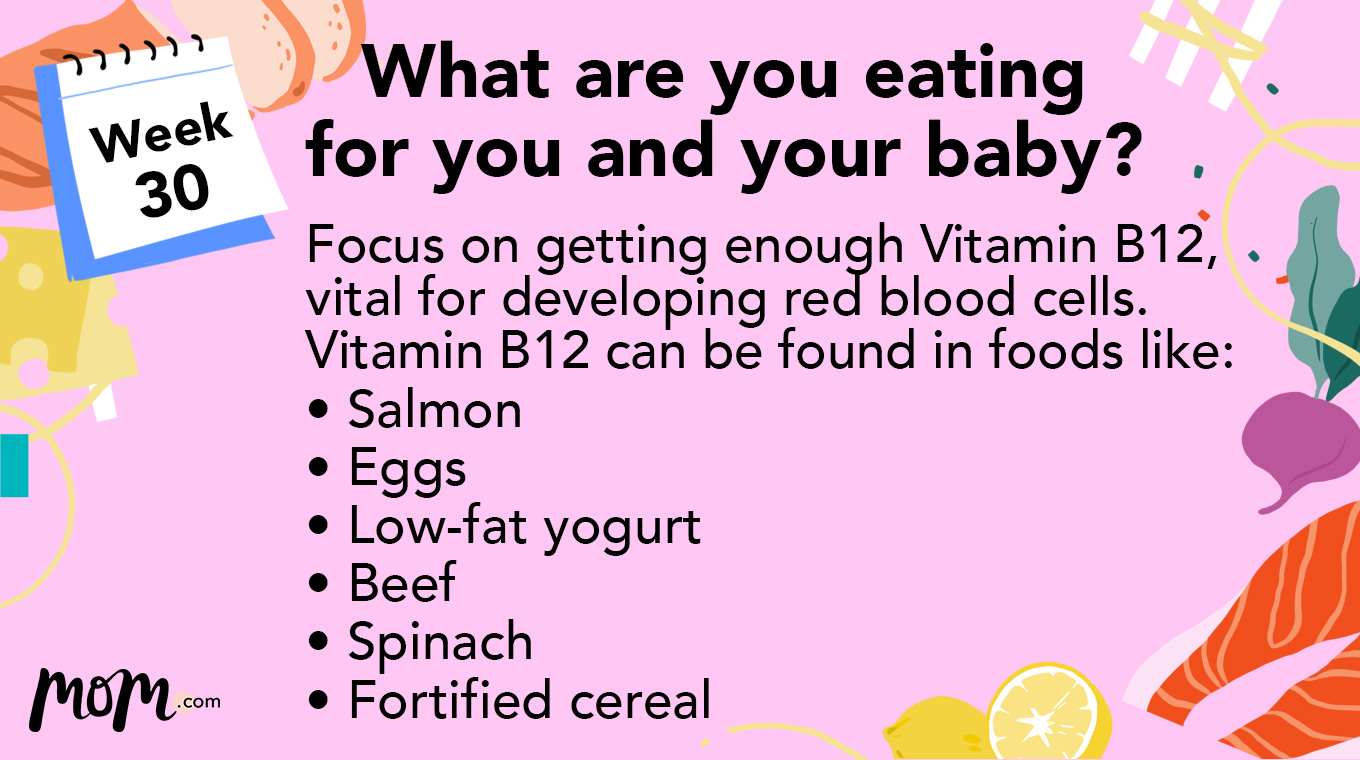
In this article
You’re 30 weeks pregnant!
If your pregnancy isn’t already real enough to you, this might be the week it finally hits. Week 30 is here, leaving just 10 weeks (give or take) until you meet your baby — and that also means that the pressure is officially on. Is that nursery ready? Is that hospital bag packed? It can definitely be overwhelming… to say the least.
Now that you’ve hit the big 3-0, read on for what’s coming this week.
Pregnancy symptoms at 30 weeks

Even this far into pregnancy, the symptoms are likely still with you — and at this point, you might be noticing that some are actually worse. Here’s what you might be experiencing this week:
Body aches and pain
Your hips, back, knees… any of this sound familiar? Being pregnant is a strain on your body, and some soreness is definitely to be expected.
Stretch marks
Now that your tummy is growing by the day, you might be noticing stretch marks — and they might even be itchy. Some moistuizer should help with that.
Swelling
Swollen hands and feet might be the norm for you at this point, and if you haven’t already taken off any rings you might wear, now isn’t a bad time. Of course, if swelling appears suddenly or seems to be abnormal, it’s important to let your OB-GYN know.
Shortness of breath
Thanks to your extra passenger, you’re probably feeling it when you walk up and down stairs… or even from the parking lot to the inside of the grocery store. Don’t be afraid to slow it down — and think about that relief you’ll feel when you finally take a full, deep breath in 10 weeks from now!
What does 30 weeks equal in months?
In week 30 of pregnancy, how many months along are you? Yay — you’re finally seven months pregnant!
Your ultrasound
It’s not likely you’ll get an ultrasound this week, but that doesn’t mean your baby isn’t doing some pretty impressive stuff. Their brain is constantly developing, they’re growing their own red blood cells, and they’re probably head down at this point, preparing for their big entrance.
Your pregnant belly at 30 weeks

Around 30 weeks pregnant, your baby is likely between 2-3 pounds, and gaining more weight all the time. And as for you? You might be around the 20-25 pound mark when it comes to your weight gain, though that is obviously different for everyone. There’s no denying you’ve got a bump at this point, though.
Pregnancy tips at 30 weeks
If you’re struggling to sleep at night, you’re definitely not alone — it can definitely be hard to get comfy these days. If you don’t already have a pregnancy pillow, it’s time to invest in one, and be sure to practice good sleep hygiene, like turning off electronics and winding down your day before bedtime to help the process along.
Your pregnancy checklist at 30 weeks
At 30 weeks pregnant, you might want to be doing the following:
- Finalizing your birth plan
- Packing your hospital bag
- Making plans for pets and other children for while you’re in the hospital
- Stocking up on items for postpartum healing
What are you eating for you and your baby?

Since baby’s developing those red blood cells this week, it’s a good time to make sure you’re getting enough Vitamin B12, which is essential in the formation of those cells. Vitamin B12 can be found in foods like:
- Salmon
- Eggs
- Low-fat yogurt
- Beef
- Spinach
- Fortified cereal
When to call your doctor
While you should definitely call your OB-GYN anytime you feel something might be amiss, any unusual bleeding or cramping are both reasons to get a visit in ASAP, as well as experiencing symptoms like painful urination. And if that lightheadness you might be feeling leads to actual fainting or passing out, it’s important to call or stop into your emergency room, too.
Keep an eye out for any unusual swelling, since that could be a sign of preeclampsia, and it’s important to call your doctor if you have itchy palms or feet, which might mean that you’re experiencing cholestasis.
According to the Centers for Disease Control and Prevention (CDC), pregnant women are at a higher risk of severe illness from COVID-19 and death compared to non-pregnant women. Furthermore, pregnant people with COVID-19 are at increased risk of delivering a baby before 37 weeks (preterm birth) and other adverse ramifications.
Note: If you are visiting a medical professional during COVID, make sure to ask about the facility’s safety measures and confirm that they are following COVID protocols as indicated by the CDC.
Special Considerations: LGBTQ
Despite the fact that it’s 2021, the journey to becoming a parent while LGBTQ is still quite different than it is for other parents — and that can include unexpected costs that pop up even after baby is born. Aside from the costs of surrogacy, artificial insemination, or adoption (and the actual hospital bill, if applicable), you may also need to pay legal fees for the non-birthing partner to become your baby’s guardian. Now is a good time to research what those costs might be and prepare as much as possible before your baby’s arrival.






